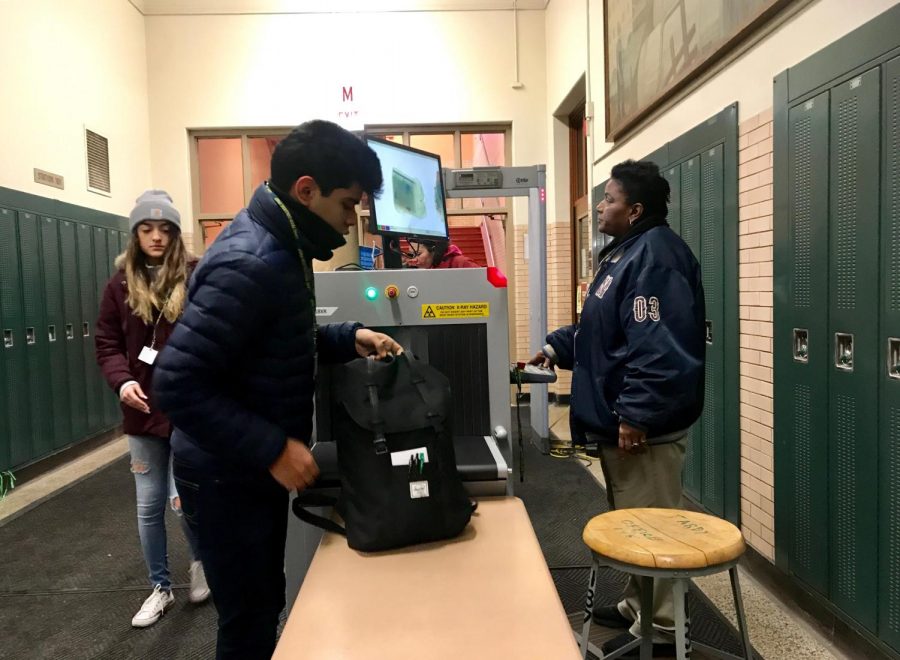Security’s sacrifices for students’ safety
Security guard Mrs. Jackson examining students’ bags with an X-Ray baggage scanner to check for any potentially dangerous objects. Every day after 8:15, all students’ bags are checked.
It’s three days before winter break. Students are rushing to turn in assignments and waiting for Friday to finally arrive. Then, at 10:40 p.m. on a cold Monday night, a school-wide email is sent out to the Lane community discussing a possible threat to Lane.
The email explicitly stated how there was a threat on Lane, specifically on Dec. 20, and the administration and security would make sure everyone would be safe.
What measures would the security guards take to ensure the threat did not become a reality?
Are they prepared if something does happen?
These are questions that run through the head of Mr. Smith, who has been chief of security at Lane for four years.
“I have to go through every possible scenario in my head to keep everyone safe,” Smith said. “As I put it, most normal people don’t go to bed thinking of a school shooting and waking up thinking about a school shooting, but I do.”
There was a noticeable heightened security presence those last three days before break. Smith especially was on high alert for any suspicious activities around Lane.
After learning there was a threat written in the bathroom, Smith said he felt a combination of sad and nervous emotions.
“I cannot be positive, but if it was a Lane Tech student I would be sad, because I expect more of the students,” Smith said. “I give more, my team gives more, and if it was meant as a joke, it was not a funny joke, especially these days.”
Smith found it alarming that a student would make a joke or threat so serious. He described how he had to take extra steps to mentally prepare himself and the security staff for any case of emergency.
“If something happens, like any type of threat or any type of joke, it turns my world upside down because I have to think of all the worst possibilities that might happen,” Smith said. “And not because I want to, but because my team and I have to be mentally prepared for whatever happens.”
It’s been noted that professionals in law enforcement or security are at risk for developing post-traumatic stress disorder (PTSD), from seeing the violence they see every day, according to a Chicago Sun-Times article.
“For my job, if you didn’t know how to handle it, dealing with some type of threat, lockdowns, fire drills and any case of emergency, it can play with your mind a little bit,” Smith said. “I think it takes a very strong and different type of person to handle it.”
In these types of emergencies, it’s important for everyone to have a fight or flight response, especially security guards, because it gives them the determination to protect the students and staff around them.
Dr. Gilson, Lane’s school psychologist, clarified that your fight-or-flight response can be influenced by your life experiences.
“It is located in your amygdala, and it is a very primitive part of your brain that is heightened at certain times and gives you determination,” Gilson said.
Gilson described how security guards may be more likely to respond effectively to danger they encounter.
“If you are exposed to that stimuli, it might make you an anxious person,” Gilson said. “But if you are exposed to a lot of it, you might become desensitized to the things that heighten a lot of us. There is a unique population of people who choose to go into law enforcement, so maybe it’s people who are predisposed to tolerate a good amount of anxiety and can perform very well under pressure.”
Gilson also said that it’s good to have anxiety so we can be fully aware of our surroundings.
Gilson compared the benefits of having anxiety on a scale of zero to ten.
“I would not want anyone to be on a scale of zero because without anxiety or stress you wouldn’t be able to breathe or safely walk through the halls of Lane Tech,” Gilson said.
“Ten is a panic episode, and that is not OK either. If you are someone who enjoys a lot of drama and high activity, your scale may be six to eight. If you are someone who likes things very calm and predictable, your scale may be two to four.”
Other Lane security guards said that they were not very scared before or after the threat, citing how Lane students are respectful of their school, classmates and teachers.
Mr. Lopez, a security guard in his fifth year at Lane, said he agrees with this.
“The students here at Lane are fantastic,” Lopez said. “I’ve been to schools where you have to be on guard at all times because you never knew what was going to happen.”
Lopez said there are steps to make being a security guard easier at Lane and for sustaining a safe environment.
“We don’t know every student coming into the building, and it’s harder for us to know if every student who comes in here really does go to Lane when they don’t wear their IDs,” Lopez said. “We have to know why you are coming in here and what you are gonna do here.”
Smith stressed that in this field, you should be prepared for challenges and practice ways to alleviate the stress you may experience in this job.
“It has come close a couple times with me that I have felt that I was losing my head and I always give myself that count to ten,” Smith said. “I always remind myself of why I’m doing this, which is to protect the students of Lane.”
Your donations directly fund the Lane Tech student journalism program—covering essential costs like website hosting and technology not supported by our school or district. Your generosity empowers our student reporters to investigate, write, and publish impactful stories that matter to our school community.
This website is more than a publishing platform—it's an archive, a research tool, and a source of truth. Every dollar helps us preserve and grow this resource so future students can learn from and build on the work being done today.
Thank you for supporting the next generation of journalists at Lane Tech College Prep!
Maryann Ress is a senior at Lane Tech. This is her second year taking journalism and is now news editor of The Warrior. She is a member of the National...

Anahi is currently a senior at Lane. She has been part of The Warrior since her junior year and is now Managing Editor. She’s been part of Varsity Cheerleading...




